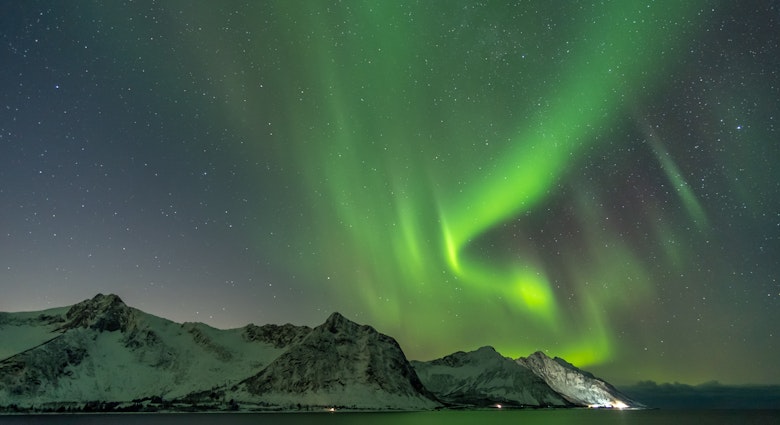
Why the Westfjords are the place to escape the crowds in Iceland
Jan 24, 2020 • 4 min read

The impact of tourism in Iceland has been widely documented, from a Justin Bieber music video closing a canyon to rules being introduced to improve the behaviour of campers. But problems caused by too many tourists are generally confined to the well-trodden south of the country, and by visiting Iceland’s furthest reaches you can escape the crowds altogether and benefit regions that need tourism most.

No more so than in the stunningly remote Westfjords in Iceland’s far northwest, a hauntingly beautiful region that receives less than 10% of Iceland's tourism and actively wants more visitors. Here lonely roads weave past brooding fjords and hulking mountains, punctuated by fishing communities that have made this unforgiving terrain home.
Getting to the Westfjords
My journey to the Westfjords began with a journey in a tiny propeller plane from Reykjavík to the region’s capital Ísafjörður. The landing was hair-raising, with the plane banking sharply to the left as it descended along the fjord, then completing a 180-degree turn as it came in to land, made all the more dramatic by that day’s relentless rain and ominous grey skies. Once off the plane, I was hit by the power of the enormous black mountains that surrounded me above.
Local culture in Ísafjörður
I set out to explore Ísafjörður, an easygoing little place where 18th-century buildings bear witness to a seafaring past. The town is full of cute places to eat and I had lunch at Heimabyggð, wolfing down a moreish beetroot stew and delicious coffee amid the cosy interior as rain lashed down outside.
Then I popped into the Museum of Everyday Life. I wasn’t expecting much from this tiny spot, but it was truly one of the most moving, fascinating museums I’ve been to, documenting the lives of local residents in humorous, often very poignant, ways. On one wall are shoes accompanied by headphones that allow you to listen to stories narrated by the footwear’s owners, while on another, old hardback books have photos and letters taped into them.

The Arctic Fox Center at Súðavík
Next I headed east to Súðavík, as sullen grey clouds swirled around snow-dusted mountaintops above a metallic blue sea, lurid yellow-green grass and black rocks. There’s not much here, but the Arctic Fox Center is well worth a visit. The museum dedicated to these lovable creatures is interesting, but the real highlight is seeing the orphaned fox who lives on-site (once reared by humans, Arctic foxes cannot be released back into the wild). Their resident good boy, Móri, is impossibly cute.
A night in Flateyri
That night I stayed in sleepy Flateyri, which occupies a dramatic location jutting into Önundarfjörður beneath watchful mountains. After a browse in the delightful timewarp of the Old Bookstore, I settled in for the night at Bergshús, a former hospital beautifully converted into a house with views over the water.

Wales and waterfalls at Dynjandi and Bíldudalur
The next day I set off for Bíldudalur, and this was my favourite journey of the trip: a stunning drive alongside gleaming fjords and over mountains blanketed in white. Around every corner seemed to be yet another completely unspoilt view that had lain unchanged for millennia. The highlight, though, was a stop at Dynjandi, which is quite rightly the Westfjords’ most famous waterfall. As I climbed up to the thundering cascade, I was rewarded with ever more spectacular views back over the fjord.
I arrived in tiny Bíldudalur, which has an enviable location on serene Arnarfjörður. After a quick visit to the entertaining and fun Sea Monster Museum, full of tales of local sightings, I went on a whale-watching tour with Westfjords Adventures. Being out on the fjord taking in the scenery would have been impressive enough in its own right, but it was made even more special by the chance to see these majestic creatures in their natural habitat. The tour is run by couple Fríða and Gummi, who were also our hosts that night at cosy B&B Harbour Inn. I dined at Vegamót, which unsurprisingly serves top-notch fish and chips as well as excellent burgers.
Rauðasandur and Hellulaug
The final morning was my last in the Westfjords, and on my drive out of the region I stopped off at Rauðasandur, an enormous expanse of multihued sand that drifts off in every direction in varying shades of red, orange and yellow. There wasn’t a soul on this vast, windswept beach, and it was one of the highlights of the trip. The perfect goodbye to the Westfjords, though, was relaxing in Hellulaug, a thermal pool perched on a rocky stretch of seashore. Like pretty much everywhere else I’d visited in the Westfjords, there was no one else to interrupt the peace as I soaked in 38°C heat admiring the final views of this incredible part of the world.
You might also like:
8 Iceland activities for adventure seekers
The real-life magic of rescuing baby puffins in the Westman Islands
The land of fire and ice: touring Iceland's Golden Circle
Explore related stories







 Wildlife & NatureEarthquakes and volcanic activity in Iceland. Here’s what travelers should know
Wildlife & NatureEarthquakes and volcanic activity in Iceland. Here’s what travelers should knowNov 13, 2023 • 5 min read


